Almost There: Mia Farrow in "Broadway Danny Rose"
 Tuesday, July 12, 2022 at 5:51PM
Tuesday, July 12, 2022 at 5:51PM 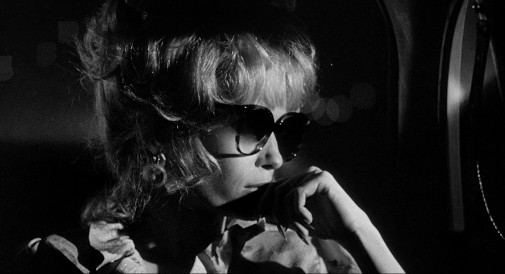
When presenting his list of new streaming titles for July, Nathaniel paid special attention to the 1984 Woody Allen comedy Broadway Danny Rose. It was the first Allen film he ever saw, and the first time Mia Farrow got serious Oscar buzz for her collaborations with the director. Previously, her closest brush with the Academy Awards had come with Rosemary's Baby, way back in 1968. But, of course, as we know, that buzz never materialized into an actual nomination, and Farrow remains Oscarless to this day, despite a filmography full of incredible performances. Indeed, this series could have an extensive miniseries dedicated exclusively to the actress, so vast is her number of "Almost There" cases.
That miniseries might happen one day, but, for now, let's focus only on Broadway Danny Rose and Mia Farrow's brilliant work in it…
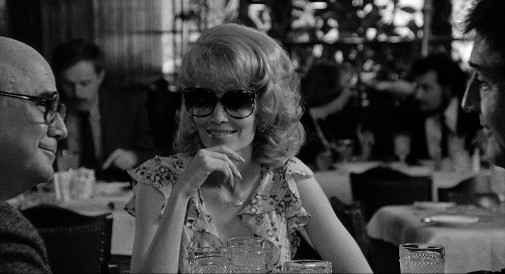
Conceived as a love letter to the cabaret comedy scene, Broadway Danny Rose is the story of a small-time booking agent whose clients always leave him once they hit big. The entire thing is told in flashback, an extended anecdote shared by a group of comedians over lunch, remembering Rose's one-man talent agency. This particular tale concerns his dealings with Lou Canova, a singer and lounge lizard type who, besides enjoying a career upswing, is juggling a wife, three kids, and a mistress. This latter figure is Tina Vitale, a tough broad whose previous lover – a New York gangster – is still head over heels for her.
The main narrative of this fleetfooted 84-minute flick finds Danny doing what he always does – taking care of his client's needs, both professional and personal. Specifically, he brings Tina to one of Lou's gigs, acting as her "beard" and catching the eye of the woman's criminal ex, who promptly calls a hit on Danny in a fit of jealousy. Most of the narrative follows the odd couple as they try to bullshit their way out of sticky situations, all while the agent's unstable career feels on the brink of ruin. Allen called it his Italian flick, inspired by the works of De Sica and the like. It's not necessarily a work of Neorealism, but it has a few affectations.
With Gordon Willis' grainy black-and-white cinematography and a focus on street-level characters, Broadway Danny Rose does feel more attuned to a milieu of urban lowlifes rather than upper-class neurosis. Moreover, there's the soundtrack full of Italian tunes, the relatively downbeat ending, and casting choices that favored the work of real comedians and other Borsch Belt entertainers playing versions of themselves. However, one can spot a veneer of nostalgia that combats the potential realism of the period setting. Allen wanted to shoot it as a late 1940s-set story but later pushed it to a version of the 1960s that looks a lot like 1984.
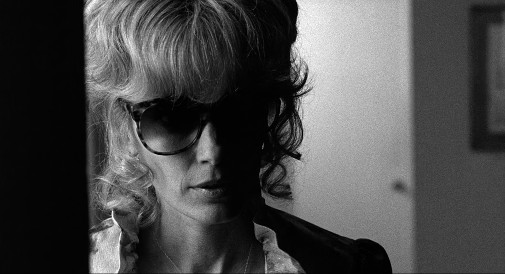
This need to elegize, perhaps even romanticize, aspects of the New York past and show business, in particular, extends to the characterizations. Such is true of both leads, but Tina especially. In the project's genesis, Mia Farrow wanted to play a version of Annie Rao of the legendary Italian restaurant Rao's. Obviously, the actress didn't end up portraying that real-life figure, but there's a palpable wish to shapeshift herself into a figure, unlike her other Allen women. Farrow almost makes Tina into a caricature by playing with padding, a nasal voice peppered with accented twists, and a pair of ever-present sunglasses to finish off Jeffrey Kurland's costume.
She never entirely goes over the edge, keeping herself from jumping the shark or flattening this brassy woman with a past. It's one hell of a balancing act, holding on to the audiovisual extravagance while also illuminating the character's humanity. Such tricky challenges are evident from her first scene, walking into the film, 20 minutes in. Her first shot is a closeup, carefully lit so that we can't see the eyes behind the shades. Then, after a second of contemplation, the faint tremble of a smirk burst into loud theatrics as Tina quarrels with Lou through the phone. It's a fantastic introduction, juxtaposing how unknowable she is to Danny and the loudness of her screen presence.
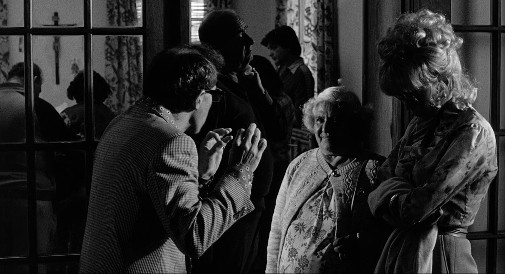
Storming through her apartment, she's a furious hurricane that barely acknowledges the twerp trying to convince her to attend her two-timing boyfriend's latest show. Farrow makes dismissiveness into an artform, studiously ignoring her scene partner while allowing her physicality to delineate how aggravating it is to share space with him. As they visit Tina's fortune teller, notice the nervous energy of the actress, standing by while Danny monologues. The figure never stops twisting and twitching, as if an electrical current was constantly coursing through the woman. Her irritation at Danny and her paramours is a full-bodied experience.
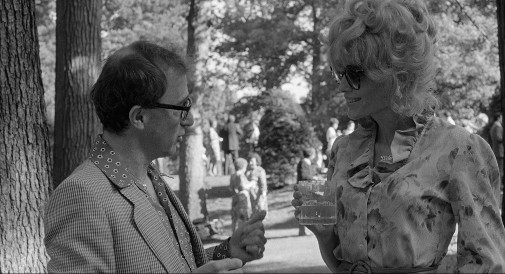
And yet, Tina's not a unidimensional character who does nothing more than express her contempt. There's much more to her, and Farrow is constantly playing dissonant grace notes that ground the general zaniness of the scenario. For example, she plays unexpected seriousness when listening to the fortune teller's advice. Later, as she's starting to open up to Danny, a softness shines through her vexed countenance, a smile blossoming between bouts of gum-chewing. Her arc is not like a glacier steadily melting, however. Instead, Farrow allows Tina's moods to go up and down. A scene after being vulnerable, she's back to the unapproachable cool of her first closeup.
As dispassionate as she can sometimes come across, this former mobster sweetheart doesn't want to see Danny shot down. That doesn't mean she's not vexed by his garrulous self, though. On other occasions, like when describing her aspirations as an interior decorator, his same schmooze can awaken genuine delight in Tina, followed by a need for palpable approval. Much of the comedy comes from the variations Farrow brings to her chemistry with Allen, peppering the picture with exciting unpredictability. It's also important to note that, as written, Tina doesn't have a lot of zingers.
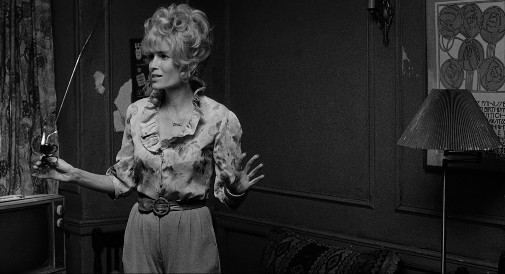
That means the farcical side of her character depends on the behavioral cues Farrow's so good at playing. More importantly, such textual choices also avoid the obviousness her costume could suggest or even the perception of forced funny business. Even as she's a clear-cut exaggeration and her predicament grows in absurdity, Tina feels human, her reactions organic. As Broadway Danny Rose arrives at its last act, the comedy sours into a drama of curdled guilt, and Farrow plays it accordingly, taking center stage at long last. It's a fragile place to end her performance, a whisper of melancholy serving as the cherry on top of one of Mia Farrow's best works.
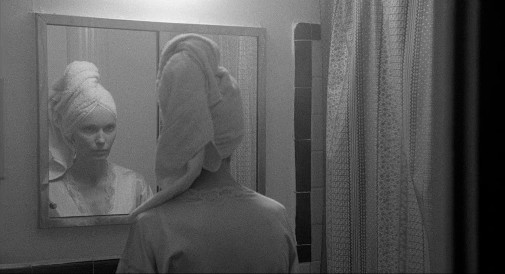
The Academy certainly liked Broadway Danny Rose, bestowing two nominations upon Woody Allen, both for the picture's screenplay and direction. However, Mia Farrow was left out of the honors, despite having been nominated for the Golden Globe. Instead, 1984 was the year when farming stories dominated the Best Actress category, leaving no space for Farrow's erstwhile gangster moll. The nominees were Judy Davis in A Passage to India, Sally Field in Places in the Heart, Jessica Lange in Country, Vanessa Redgrave in The Bostonians, and Sissy Spacek in The River. Field famously won her second Academy Award that year. As for Mia Farrow, she kept on delivering incredible performances that AMPAS stubbornly ignored. To this day, she's never been nominated, nor has she been singled out for an Honorary Oscar.
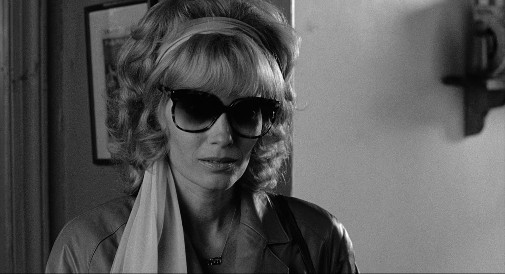
Broadway Danny Rose is streaming on many platforms, including Amazon Prime Video and Paramount+. You can also find the film available to rent on most services.



Reader Comments (9)
Oh, she is great in this as I think this is her best work with Woody.
You made me want to see this film again,was she seriously buzzed at the time,i'd assumed she was a GG nominee who had no chance.
I think i'd chuck out Davis for Mia,Davis is off somehow in APTI,I really like the 3 farmwives esp Sissy and Jessica and don't get the Kathleen Turner love,she's great in RTS but I don't think her snub is so egregious.
"Broadway Danny Rose" is a great movie, but I struggle to really remember her in it.
My favourite Allen performance of hers is probably "The Purple Rose of Cairo" - though "Hannah and Her Sisters" is most absolutely my favourite film of his.
I think Purple Rose of Cairo is certainly her best Woody Allen performance, and Hannah and Danny Rose closely tied for second. She deserved nominations for all three.
Mia should be at least a 3-time nominee and it could be reasonably argued that she should have as many as 5 nominations. As to why she hasn’t been given an Honorary Oscar, I can’t help but wonder if it’s because of the awkward situation she’s in where it’s like…how do you even talk about her career without heavily focusing on her work with Woody Allen and Roman Polanski? They might just not want to go there at this point because even though she herself is obviously deserving, her career is so intrinsically linked to directors considered problematic.
Mia Farrow is the queen of “she was NEVER nominated?!” Cameron Diaz is up there too, moreso bc she was very likely in sixth place TWICE w all the precursor support. And obviously Emily Blunt has joined the club as well.
It's crazy the number of actresses Allen directed to nominations and wins, but the woman he directed the most, and with the most variety of parts, failed to ever get a nomination. She's absolutely worthy here, and at least half of her other performances for Allen. Purple Rose of Cairo in particular is an all-time great IMO.
Even on multiple viewings, I crack up thinking about Mia and her association with Frank Sinatra and his satellite of ‘friends.’ I’m sure that Woody Allen picked her brain about this looking for in-jokes. Still love the scene when the pair are running through the warehouse full of parade balloons.
Can’t understand at this point in time why the Academy will give an Honorary Oscar to Michael J. Fox and his ‘filmography,’ yet nothing for Mia Farrow.
Wow, 84 minutes—can you imagine?
I've seen dozens of WA movies but not this one, I'm sold.
Farrow is a compelling screen presence but I do find the "Justice for Mia Farrow" narrative overdone—at best she missed a couple of nominations 30-40 years ago, she's not among the greatest of her generation. It's odd that she was never welcomed into the club with a courtesy nomination or two but they would've been just that—I can't think of a time she really deserved to run away with trophies for a performance.